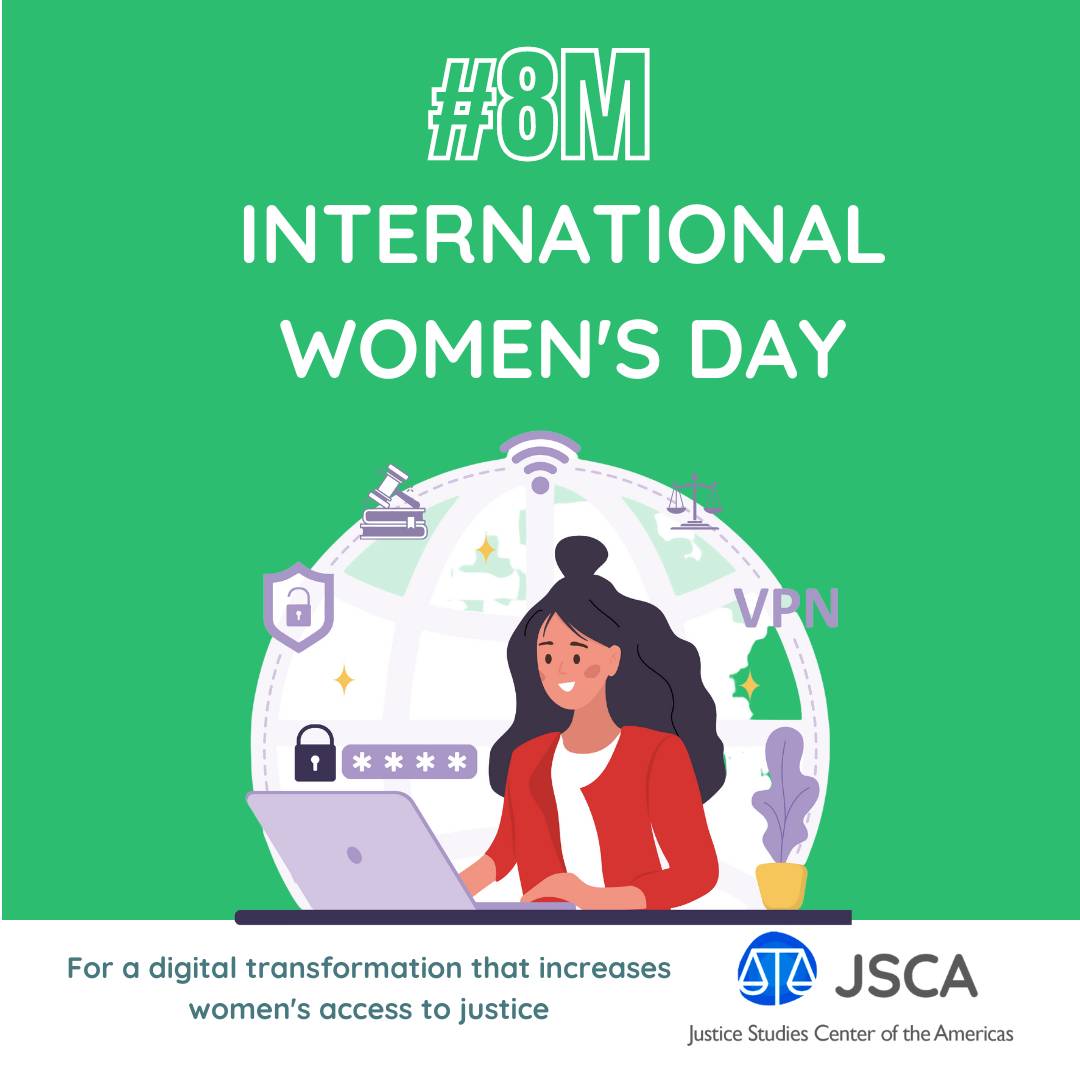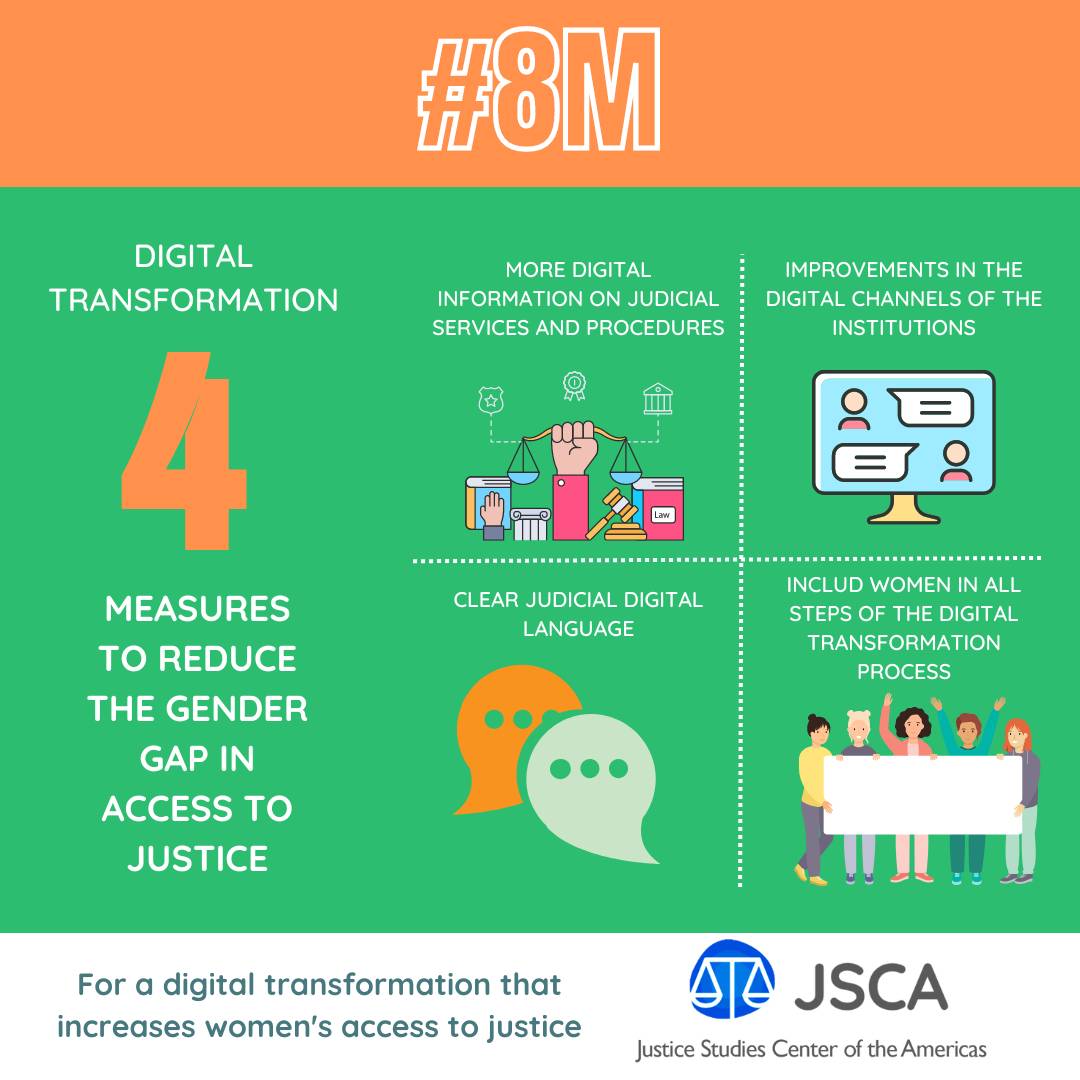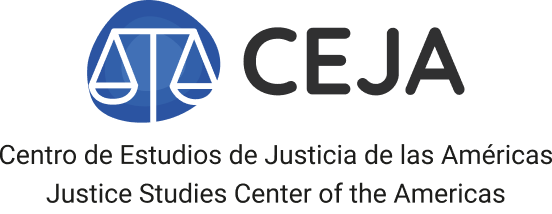 On International Women’s Day, the Justice Studies Center of the Americas (JSCA), an international organization created by the Organization of American States, joins the United Nations campaign “DigitALL: Innovation and technology for gender equality”, and calls on States, and especially the justice institutions of all countries in the Americas, to push for a digital justice system that promotes women’s access to justice.
On International Women’s Day, the Justice Studies Center of the Americas (JSCA), an international organization created by the Organization of American States, joins the United Nations campaign “DigitALL: Innovation and technology for gender equality”, and calls on States, and especially the justice institutions of all countries in the Americas, to push for a digital justice system that promotes women’s access to justice.
JSCA emphasizes that digital transformation should contribute to reducing the deep gaps in access to justice that exist in the Americas, improving the justice standards and the relationship between institutions and citizens. In this context, the recent regional discussion organized by JSCA on the contributions and limitations of virtual hearings from a people-centered approach to justice highlighted the need for the use of technologies to contribute to the full exercise of rights and respect for fundamental guarantees, as well as to equality and non-discrimination in access to justice.
guarantees, as well as to equality and non-discrimination in access to justice.
JSCA has warned that the gender digital divide is a barrier that women face in accessing justice systems in the region, with women in rural areas and indigenous communities being the most affected. Judicial digital exclusion is even higher for poor, Afro-descendant and disabled women.
“It is essential that the digital transformation processes in the justice systems of the Americas contribute to reducing the gap in access to justice for women in all its forms. From JSCA’s perspective, this encompasses at least four areas: more digital information for women on judicial services and procedures; improvements in the digital channels of justice institutions for women users; clear judicial digital language for women, with an intersectional approach; and the involvement of women in the leadership required for the digital transformation of justice in the countries of the region,” says Nataly Ponce, Executive Director of JSCA.
JSCA’s Strategic Plan 2022-2026 defines the organization’s priorities as supporting the design of roadmaps for the digital transformation of justice with a people-centered approach and the reduction of gaps in access to justice for women and vulnerable populations. In this framework, JSCA reaffirms its commitment and calls on justice institutions in the Americas to approach digital transformation from a gender perspective and with an intersectional dimension.
 Finally, JSCA highlights its recent contributions to promote a gender approach to justice in the Americas, which include the Seminar on Gender Equality in Access to Justice from an Intersectional Perspective, the study on Criminal Defense with a Gender Perspective, the analysis of Gender Judicial Offices in Latin America, and the training programs on gender and justice and on criminal prosecution and resocialization in cases of gender-based violence in Latin America and the Caribbean.
Finally, JSCA highlights its recent contributions to promote a gender approach to justice in the Americas, which include the Seminar on Gender Equality in Access to Justice from an Intersectional Perspective, the study on Criminal Defense with a Gender Perspective, the analysis of Gender Judicial Offices in Latin America, and the training programs on gender and justice and on criminal prosecution and resocialization in cases of gender-based violence in Latin America and the Caribbean.
The Justice Studies Center of the Americas (JSCA) is an intergovernmental body of the Inter-American System with technical and operational autonomy, created by the OAS General Assembly in 1999, whose mission is to support the processes of reform and modernization of the systems justice in the Americas.
JSCA provides technical assistance to governments, judiciaries, public ministries and other justice institutions; prepares technical studies and generates empirical evidence; facilitates cooperation processes at the regional level; and provides specialized training to justice policymakers and operators in the countries of the Americas.
